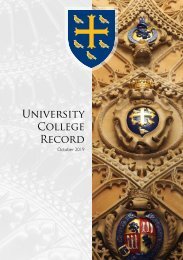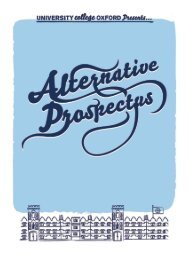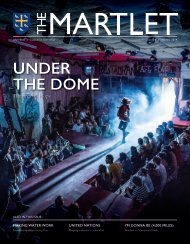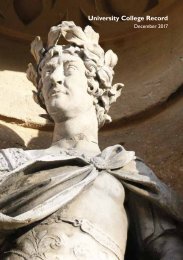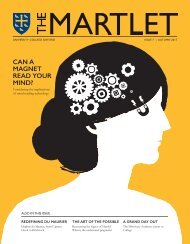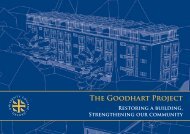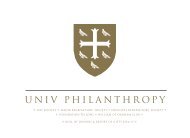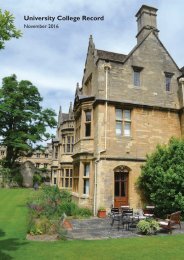Univ Record 2018
University College Oxford Record 2018
University College Oxford Record 2018
You also want an ePaper? Increase the reach of your titles
YUMPU automatically turns print PDFs into web optimized ePapers that Google loves.
highly on the Mensa test<br />
was an early verification that<br />
his brain was unharmed.<br />
The final diagnosis of ALS<br />
took place about 12 months<br />
later.<br />
It is important to note<br />
that Steve has said he was<br />
fairly lonely and bored in his<br />
early undergraduate years.<br />
However, he was recognised<br />
by all of us, his 100 or so<br />
peers at <strong>Univ</strong>ersity College,<br />
that he was the most<br />
intelligent person we had<br />
ever met, while the rest of us<br />
were “just ordinary people”;<br />
and especially after the first<br />
year, he joined us in many of<br />
the College activities. He was after all two years younger than most of us, and we mostly<br />
did not have his strongly intellectual family background, which perhaps restrained him<br />
initially in all the non-physics adventuring of typical undergraduates.<br />
Regarding the final exam from Oxford, the rest of us knew as soon as we found his<br />
name on the “viva” list for a first class honours degree (after the grading of the written<br />
exams), that he would get his First and go on to his first choice for graduate work,<br />
Cambridge, then the mecca for cosmology.<br />
The rest is well-known history, as Steve returned to mathematical physics for his<br />
life’s work, and taught the whole world his wonderful example of determined success<br />
in the face of extreme physical adversity. As physicists we will be always grateful for his<br />
efforts in developing detailed theories of our universe and driving our understanding of<br />
the cosmos forward; putting into words explanations that could be mostly understood<br />
by other non-scientists. Those explanations were able to excite the imaginations of the<br />
general population, making them value the sense that humans can better understand<br />
the immensity of the universe, and the place of humans there. He was THE human<br />
“supernova of our time”.<br />
We last met about four years ago in Cambridge in his office and at home – it was<br />
delightful to find that his strong sense of humour was undiminished – I think a strong<br />
force in helping him overcome his heath adversities. He immediately decided that us four<br />
<strong>Univ</strong>ersity College physics undergraduates (Derek Powney, Richard Bryan, Steve and<br />
myself) should get together again – we began the process, but tracking down Powney<br />
and Bryan took more time than we had available to us – too bad the meeting never<br />
happened. I just close with a photo of our meeting in his office at that time, soon after<br />
the release of the movie Hawking (2013), directed by Stephen Finnigan.<br />
Stephen William Hawking was born 300 years after Galileo’s death day, 8 February,<br />
and died 139 years after Einstein’s birthday (14 March) – an example of temporal<br />
antisymmetry.<br />
60





